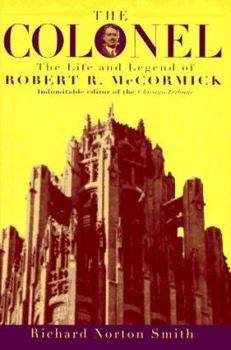The Colonel: The Life and Legend of Robert R. McCormick, 18801955
Select Format
Select Condition 
Book Overview
As editor-publisher of the Chicago Tribune, Robert R. McCormick came to personify his city. Drawing on McCormack's personal papers and years of research, Robert Norton Smith has written the definitive... This description may be from another edition of this product.
Format:Hardcover
Language:English
ISBN:0395533791
ISBN13:9780395533796
Release Date:June 1997
Publisher:Houghton Mifflin
Length:597 Pages
Weight:2.26 lbs.
Dimensions:1.9" x 6.3" x 9.3"
Customer Reviews
3 ratings
the colonel
Published by Thriftbooks.com User , 16 years ago
excellant book in capturing the spirit of chicago and most important of the power oif the press the vast right wing conspiracy thatwas then and Holy ruppert murdoch still has power now......mccormick is portrayed not as a one dimensional crank but as a multi- dimensional figure whose family has influenced the nature of our nation....
The Man in the Tower and the World's Greatest Newspaper
Published by Thriftbooks.com User , 16 years ago
This was an interesting book, but not entirely satisfactory. There is a wealth of material to be found here, but one gets the feeling that the historian did not explore numerous topics in great detail. Many of Robert R. McCormick's relatives are mentioned, but seldom are their lives discussed at length. I was left wanting to know much more than what was provided in the biography. I had the feeling that there was more material that could have been added to the text, but the author or publisher wanted to produce a book of a certain length and did not want to exceed a given number of pages. Still, the book whetted my appetite for further reading on the same topic. My paternal grandfather listened to the Colonel's broadcasts on WGN Radio each Sunday night and laughed out loud at the publisher's pronouncements according to what I was told by my own father. I have visited McCormick estate at Cantigny and live within walking distance of the North Shore Channel that McCormick built while serving as the President of the Metropolitan Sanitary District, but, even after reading this superb biography, the man's character seems elusive. The only fault that I found in the text is that Smith likes to move the narrative back and forth too often for my liking. A McCormick family member drops out of the proceedings without a solitary mention for several chapters and just as suddenly reappears and then the reader is informed about all of the significant events that took place in the intervening decade concerning this individual. This becomes tedious. Smith tells you what the Colonel said and did, but seldom suggests why he acted as he did. For example, McCormick was socially ostracized after his first marriage and forced to relocate from the North Shore to DuPage County, but I still cannot see what possessed him to conduct an affair with a relative's spouse (the couple married after the woman's divorce was granted). Colonel McCormick was an astute businessman and made wise long term investments in Canadian paper mills that benefitted his publication. As influential as McCormick was in terms of national politics, his antagonism towards local Republican party bosses and his friendly relations with Democratic city officials may have caused irreparable injury to the fortunes of the Republican party in Illinois. Chicago certainly could use a newspaper publisher of his caliber today. At least when McCormick headed "The Chicago Tribune" it stood for something. Today, it is a weak middle of the road journal with a declining number of subscribers. Earlier this week, it was announced that the Tribune printing plants handling regional editions of the paper would be closed. A digression: Richard Norton Smith is currently the curator for the Abraham Lincoln Museum in Springfield, Illinois. He formerly headed the Gerald R. Ford Presidential Museum in Grand Rapids, Michigan. Former US Senator Peter Fitzgerald of Illinois battled to place Smith in his current posi
An excellent biography of a fascinating man.
Published by Thriftbooks.com User , 26 years ago
In this book, Richard Norton Smith does a first-rate job of recounting McCormick's life, going far in seperating the man from the public image that we have of him today. Balanced and judicious, it also makes for excellent reading, as Smith presents McCormick's life in an engaging manner. If there is a flaw in the book, it is in Smith's failure to adequately explain how the view of McCormick as a hidebound reactionary came to overshadow many aspects of his life, such as his early career as a progressive in local politics, or his legal campaigns in support of the First Amendment. This is a must-read book for anybody interested in Chicago's past, the evolution of modern journalism, or the history of twentieth century America.






